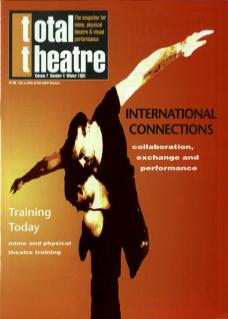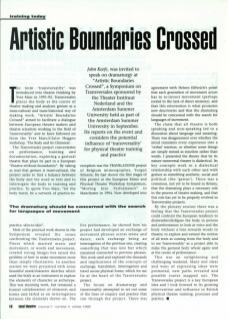The term 'transversality’ was introduced into theatre thinking by Yves Marc in 1991-92. Transversales places the body at the centre of theatre-making and analyses gesture as a transcultural and transhistorical way of making work. Artistic Boundaries Crossed aimed to facilitate a dialogue between European theatre-makers and theatre scientists working in the field of 'transversality' and to follow on from the Yves Marc/Claire Heggen workshop, The Body and its Chimeras.
The Transversales project concentrates on performance, training and documentation, exploring a gestural theatre that plays its part in a European ‘theatre-without-boundaries’. By taking as read that gesture is transcultural, the project seeks to find a balance between the body and the word or text and to interrogate the body in training and practice. To quote Yves Marc, ‘let the body travel, be a network of practice-to practice, skin-to-skin’.
Most of the practical work shown in the Symposium revealed the issues confronting the Transversales project. Pieces which married music and movement, or words and movement, created strong images but raised the problem of how to make movement more than simply illustrative. In another session we were presented with some beautiful mask/character sketches which used the body as an instrument to explore the elements of character as archetype. This was stunning work, but remained a formal collaboration of elements and forms and failed as an interrogation between the elements drawn on. The exception was the Translations project of Belgium mimeographer Yurgen Schoora. He had shown the first stages of this project at the European Mime and Physical Theatre Workshop Symposium, Moving Into Performance in Manchester in 1994. Now developed into live performance, he showed how his project had developed an exchange of movement phrases across mime and dance, each exchange being an interrogation of the previous one, creating something that was new but which remained connected to previous phrases. This work used and explored the demands and implications of the concepts of exchange, translation, interrogation and travel across physical forms, which for me lie at the heart of the Transversales project.
The dramaturg should be concerned with the search for languages of movement
The forum on dramaturgy and transversality attempted to set out some of the lines of enquiry and practice that run through the project. There was agreement with Heleen Elfferich's point that each generation of movement actors has to reinvent movement (perhaps rooted in the lack of direct memory), and that this reinvention is what promotes new discoveries and that the dramaturg should be concerned with the search for languages of movement.
The claim that all theatre is both speaking and non-speaking led to a discussion about language and meaning. There was disagreement over whether the mind translates every experience into a 'verbal’ reaction, or whether some things are simply sensed as emotion rather than words. I presented the theory that by its nature transversal theatre is dialectical. Its key concepts work in a dialectical relationship with each other and with gesture as something aesthetic, social and political (the 'gestus'). There was a consensus, yet to be found in Britain, that the dramaturg plays a necessary role in the process of theatre-making, and that this role has yet to be properly evolved in Transversales projects.
By the plenary session there was a feeling that the Transversales project could confront the European tendency to dismember/disfigure the body in process and performance; to look at voice and the body without a bias towards words in theatre; to explore and extend the notion of all texts as coming from the body and to see 'transversality' as a project able to make the gestural body whole again and at the centre of performance.
This was an enlightening and challenging weekend. Many new ideas and ways of expressing ideas were promoted, new paths revealed and possible routes mapped out. The Transversales project is a key European idea and I look forward to its growing intervention and influence in British physical theatre training, processes and practice.

